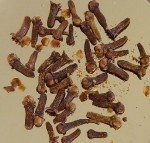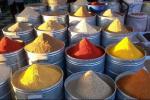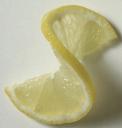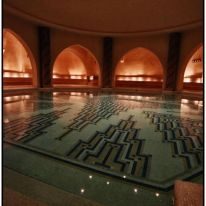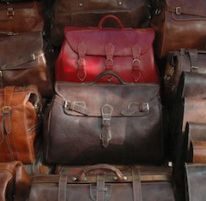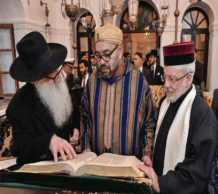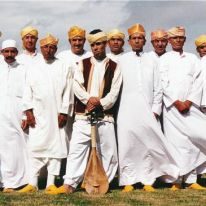
Enjoying the ambiance in various Moroccan cities is partly what a trip to Morocco is all about. When traveling to Morocco, make sure to take time out to enjoy Moroccan coffee and the cafe ambiance that each city offers. Marrakech, Tangier, Essaouira and Agadir are known for having the most and the best cafe’s, the best variety of Moroccan Arabic coffee and are spacious, comfortable hotspots for people watching. Moroccan coffee is different from American coffee. The two most commonly-ordered types are black, served in a Moroccan tea glass, and coffee with milk, usually served in a cup, but sometimes in a tea glass.There are several types of coffee with milk. The first is café cassé, which means black coffee broken with a little bit of milk. The other common type is “café nss nss” (no vowel in nss), which means half coffee (made with water) and half milk.

The third type is café crème, which means a cup of hot milk to which instant Nescafé is added (but it is not made with cream, which was never available in Morocco until recently, but would never in any case be found in a café).
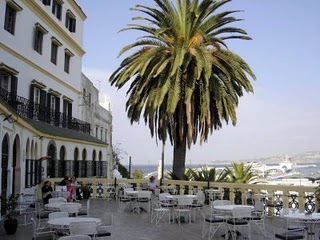
Traditionally, mint tea has been the beverage of choice in Morocco. Some travel across the world just to sample authentic Moroccan tea in the land where its masterful preparation has become almost as much of an art-form as the Japanese tea ceremony. It is believed that tea was first introduced to Morocco in the 18th century, and began spreading through the country in the mid-1800s at the time the trade between the Maghreb and Europe started flourishing. It is reported that Sultan Moulay Ismail received many bags of tea and sugar as gifts and recompenses given by European envoys in order to release European prisoners. Moroccans quickly developed a fondness for the tea, but adapted it to their own ways by adding mint.
However, according to Euromonitor International, the amount of coffee consumption in Morocco has risen steadily among Moroccans, and has especially accelerated over the past few years. An increasing number of cafés are opening all over Morocco. Instant coffee, dominated by Nescafé is very popular in Moroccan homes.
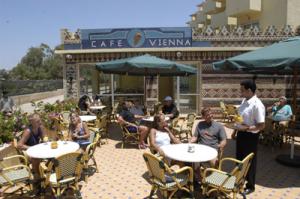
Moroccans make several variations of coffee in their own homes which you might like to try in your home.

(Note: Moroccans who use instant coffee mostly use Nescafé Classic –no substitute, or other type of Nescafé tastes the same. If you prefer, use freshly brewed strong, black coffee in place of Nescafé crystals.)

Version 1: Daily Morning Coffee, with Simple Continental Breakfast
Heat two cups of milk until boiling. Let cool one minute; remove skin. Stir in two rounded teaspoons of Nescafé crystals (or freshly brewed strong black coffee) and sugar to taste. Moroccans often serve morning coffee in two thermos pitchers, one with black coffee, the other with milk, so that each person can mix their coffee exactly as they like it.
Version 2: Coffee Spiced with Whole Cloves
Heat two cups of milk, together with three whole cloves, until boiling. Let cool one minute; remove skin; disgard cloves. Stir in two rounded teaspoons of Nescafé crystals (or freshly-brewed coffee) and sugar to taste.
Version 3: Coffee with Black Pepper
Heat two cups of milk until boiling. Let cool one minute; remove skin. Add 1/8 teaspoon of black pepper. Stir in two rounded teaspoons of Nescafé crystals (or freshly-brewed coffee) and sugar to taste.
Version 4: Coffee with Ras el Hanut
Ras el Hanut is a group of spices mixed together which translates as “top of the shop.” It is used in a variety of Moroccan dishes. Sometimes it can be purchased at Middle Eastern groceries, or better yet, on your own trip to Morocco!
If you do not have this spice mixture available, just a pinch of a few spices can be substituted in your coffee.
Heat two cups of milk until boiling. Let cool one minute; remove skin. Add 1/4 teaspoon of Ras El Hanout, OR a pinch of each of the followingground spices: cinnamon, nutmeg, cardamom, and black pepper. Stir in two rounded teaspoons of Nescafé crystals (or freshly-brewed coffee) and sugar to taste.
Version 5: Black Coffee with a Lemon Twist
Authentic version (probably imported to Morocco from France): To a cup of boiling water, add a rounded (or heaping, if stronger is preferred) teaspoon of Nescafé. Or use freshly-brewed strong coffee. Cut a 1/8-inch thick slice of lemon peel. Twist it for the oils to come out of the peel, and drop it into the coffee. Add sugar if you like it.
Variation using Lemon Juice: Add a full tablespoon of lemon juice to strong black coffee. Add three+ tablespoons of sugar. Tastes a bit like strong, black coffee flavored with lemonade. (Note: Splenda might work, since it is made from real sugar– but aspartame products definitely taste really bad with lemon juice.) This variation is excellent, but I don’t make it often because of the amount of sugar required to balance the lemon juice. (Note that lemon juice doesn’t taste right in coffee unless real sugar is used.) An additional alternative is to use a bartender’s sweetened lemon-flavored syrup.
For more information about Morocco Travel and Morocco’s Cafe Scene
For more information about Travel and Tours to Morocco plus highlights on Moroccan culture visit Morocco’s Imperial Cities, Seaside Resorts,Sahara Desert, Berber villages, A Taste of Morocco, Magical Kasbahs, Ruins & Waterfalls, Absolute Morocco, The Best of Marrakech, Fes, and Ouarzazate
Travel Exploration specializes in Morocco Travel. We provide Tours and travel opportunities to Morocco for the independent traveler and tailor-made tours for families and groups with a distinctly unique flavor. From Morocco’s Seven Imperial Cities, to the Magical Sahara Travel Exploration offers a captivating experience that will inspire you. At Travel Exploration we guarantee that you will discover the best of Morocco! Call Travel Exploration at 1 (800) 787-8806 or 1 (917)703-2078 and let’s book a tour to Morocco for you today.
Cafe scene in Morocco, Cafe scene in Marrakech, Cafe scene in Tangier, Tangier, Agadir, Essaouira, Casablanca, Fes, Fez, Meknes, Marrakesh, Marrakech, Ouarzazate, Moroccan coffee, authentic recipes for Moroccan coffee, Recipes for Arabic coffee, Recipes for Moroccan Coffee, Brochures Morocco, Holiday Travel in Morocco, Imperial Cities Tour Morocco, Cafés in Morocco, Moroccan cafés, coffee in Morocco, Moroccan recipes with Nescafé, tea in Morocco, coffee culture in Morocco, café culture in Morocco, café au Maroc, Maroc, Morocco private tours, Morocco Holidays, Morocco Travel, Travel Exploration, Travel to Morocco





